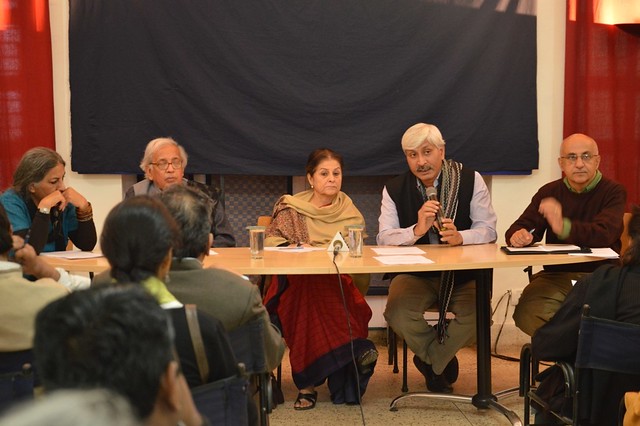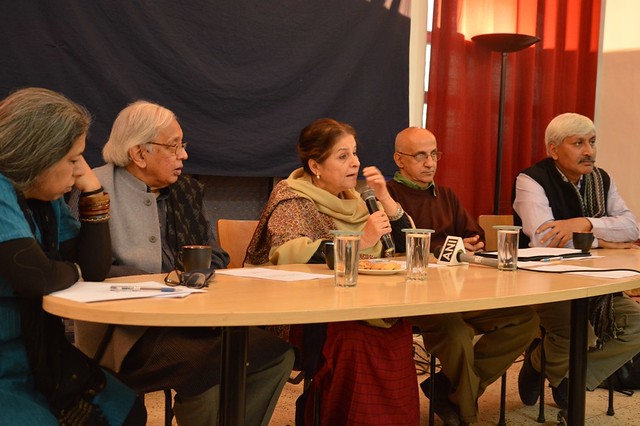The newly formed citizens’ forum to fight communal hatred in Delhi brings out report on riots off communal tension
By TwoCircles.net Staff Reporter,
New Delhi: Pointing out at a “definite pattern and imprint in the violent incidents and designs to keep the minds of minorities agitated”, scores of concerned residents, activists and thinkers from across Delhi on Wednesday said they had no hesitation in saying that the members of the ruling party and their patron organisations are responsible for this state of affairs.
Poet-essayist, cultural and art administrator and former civil servant Ashok Vajpeyi; former member of the Planning Commission and writer Syeda Hameed; writer-publisher Urvashi Butalia and former civil servant and writer Harsh Mander are among the concerned residents of Delhi who have come together to fight communal hatred in the national capital under the banner of Nagrik Ekta Manch (NEM).

As part of the NEM’s first step for a “broad-based and coordinated effort” towards countering the serious challenges and for justice and peace, it brought out a report on Delhi’s current volatile situation and documenting series of communal tensions.
Delhi has witnessed concerted efforts to stoke hatred across various localities for last two months leading to communal conflagrations – notably Trilokpuri, Bawana, Ghonda, Nand Nagari, Noore Elahi and Madanpur Khadar. Demolition of the basti in Rangpuri, fire at the Dilshad Garden church and another attack on Church in Jasola are also noteworthy, the activists listed out.
“Delhi is not just any other city or state. It is also the capital of India. Incidents as listed above and campaigns taking place here have a symbolic significance and they influence the nation in a very critical way. That is why, when heads of institutions, senior faculty members congregate at the RSS headquarters or at the World Hindu Congress or when calls are issued from ministers to make Gita a national book, we must sit up and take note,” the NEM organizers said while releasing the report.
“Meek response by other political parties is very disappointing,” they added.
Assorted community based activists, teachers and students and other concerned citizens have rushed to respond in whatever way was feasible for them – holding dialogues with community members where tension prevailed, informing and pressurizing the city administration, the minorities commission and the police into action, standing guard with the community members for stopping violence from further spiraling, providing legal and medical aid to those affected by it.
The fire-fighting attitude was not futile. While these mitigation efforts were uncoordinated they did have some positive impact, but increasingly it is being felt that long term plans need to be in place.
The activists further pointed out that hate speeches by BJP and other Hindutva leaders in the election meetings are increasing bitterness and anxiety. “The narratives make it clear that communal violence is being deliberately set to simmer in the city as Delhi’s assembly elections are likely to be announced any time. This is in tune with the recent trends during general and assembly elections which were turned into offensive exercises in communal polarization,” they added.
In a statement NEM said: “From the narratives in the report it is evident that we are faced with communalism in power. We deduce that these processes are being utilised to produce a Hindutvisation of public spaces and the public sphere. Communalism in India has entered a new phase and we feel an urgent need to understand the uniqueness of this ruling Hindutva communal project.”
NEM believes that an approach is needed to be adopted in defending the secular character of the public sphere.

Nagrik Ekta Manch is a coming together of all these efforts by groups, organisations and individuals in Delhi. The chosen name of the forum symbolically gestures at the spirit of civil society response to the 1984 Sikh Massacres in Delhi, which had coalesced under the same name.
“NEM resolves to act as a platform for organisations and individuals working in Delhi and surrounding regions against communalism, for justice and peace. For practical reason while the Manch is limited to groups and individuals active in Delhi. We recognise that Delhi’s position as the capital city of the country has historically been leveraged to make all kinds of strategic and symbolic moves,” the activists said.
Click here to read the full report on Communal Mobilisation in Delhi released by Nagrik Ekta Manch
